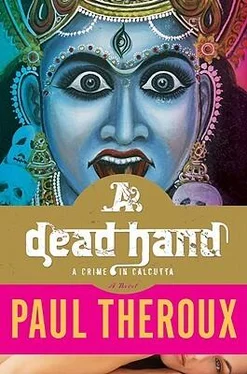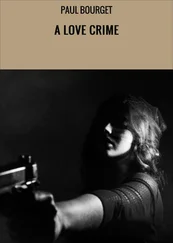"Not far, sir."
I had not said a word. Balraj had the driver's instinct for a passenger's anxiety, but I also presumed that his reassurance was his way of bucking for a tip.
The lanes were becoming narrower, the car slowing to fit through them, but at the point where I expected Balraj to speed up and pull away from a high wall of cracked stucco, he swung the car sharply, and as he did, an iron gate with rusty spikes suddenly opened and Balraj drove between a pair of flaking whitewashed pillars. A man rushed forward to open my door.
"Where are we?"
"Lodge, sir."
An old three-story plaster and brick villa, modified mock Georgian, Indian style, with porches, fluted columns, a high portico, slatted blinds, and a date at the base of a plinth, 1892. It could have been a school or a rotting hospital, but probably — this being Calcutta — it had once been the residence of a tycoon, a jute merchant or tea magnate. A fountain in the courtyard, its centerpiece a nymph in the act of emptying a water jar, was dry and the nymph was missing one arm. Two rusted urns held geraniums. A fresher eye than mine, someone new to Calcutta, would have seen the villa as derelict, but I knew that it was a usable antique: it was clean and orderly, the courtyard swept, the flowers watered, all of them deep red lilies. To one side was a gateway with a garden of shade trees visible beyond it. This was one of those Indian time warps that I had stepped into many times but without surrendering to it, because I was the traveling writer who always had to leave early the next morning for a new place. I kicked off my shoes and mounted the steps.
A man in a white smock and leggings stood barefoot at the doorway, a woman beside him in a white sari. She held the usual tray with a flame, passed it under my chin, and applied a red thumbprint to my forehead.
"Welcome to the Lodge, sir."
"Lovely place."
"Your home, sir," the man said.
I followed them inside and through a high-ceilinged lobby, across a marble floor. The ruinous outside was not repeated here: the interior was whole and cool, with painted murals of classical European landscapes on the walls of the lobby — Palladian villas set amid tall poplars, deer and birds in a pastoral scene, a great sweep of bay, perhaps Naples, all of these faded paintings blurred with an overlay of dust.
I had seen a few spas in India; this was not like any of them. The ruin on the outside did not suggest anything hygienic, and the lobby here was more suited to stuffed shirts and evening gowns. In this newer incarnation I would have said it was a school — for the odors alone, with the whiff of chalk dust in the air, the tang of varnished desks and mildewed books, the battered woodwork, the baseboards looking kicked and bumped. I imagined children jostling here. And I could hear voices: the singsong of children's laughter, the sounds of their playing, reciting, the shrieky rat-a-tat of childish taunts. And more, the tapping of feet — the peculiar dry scuff and thump of bare soles; the fleeting shapes — faces at door cracks, faces at the spindles in the upper galleries, the contending screeches of small boys, the imploring voices of little girls. Because I could not see any of them clearly, they seemed to be especially numerous, a whole mansion of murmuring children, Interrupted from time to time by the odd dull nag of an older woman.
The unseen but vibrant presence of life, an intimation of children, made me uncomfortable. I felt I'd entered by the wrong door, somewhere I didn't belong.
I looked at the man who was leading me through the cool, odorous — smell of damp mop on old tile — corridors, and I hoped to be reassured. I wanted him to say Never mind them, or to explain what the voices were.
He didn't say anything, not even his name. He didn't smile, or if he did, I could not see it beneath his mustache. He had the face-forward and rather resigned and glazed expression of an Indian menial doing his duty. That is, both submissive and slightly haughty.
We turned into another corridor — fleeting shapes of children — and then went through a latched door to an annex of the old building. A woman waiting at the door handed me a parcel, like a delivery of hotel laundry, and the man said, "You can change in there. Wear robe only and cloth slippers. Valuables will be deposited in this container" — he indicated a basket on a shelf—"for containing only. No one will disturb."
When I stepped into the changing room, he left and so did the woman. I shut the door and changed quickly, took off my watch and put it with my wallet into the basket. Just then, a knock at the door: he seemed to know that I was done.
"This way, sir."
"Where to?"
"To vault."
What he said was wait, and the word thrilled me. He led me deeper into the Lodge, past adjoining rooms and narrowing corridors to a heavy door. Behind this door was a room with a long wooden table in the center, a shower in one corner, a stool in another corner. The tiny smoke trail rising from a taper in a dish must have accounted for the fragrant and dizzying aroma.
Two young men in the room bowed to me, their hands clasped in a gesture of namaste. The taller of the two motioned me to the stool where the other had already begun to crouch.
This second man washed my feet with lukewarm water, massaging my toes, rubbing them gently, cupping my heels. It was more than mere pouring water and soaping; it was not an empty ritual but rather an act of purification, a slow and thorough cleansing of the flesh of my feet, making them live — reminding me that I had two feet.
"Table, sir."
These laconic directions were all I got. I could not tell whether they knew a whole English sentence. But it didn't matter. They had removed my robe and my wrap, and I lay face-down on the table, feeling exposed. My first thought, the fearful one, was that I was to be killed: I was in the helpless posture of an animal on a slab. I lay like a human sacrifice, blind to my captors, my ass in the air.
One of them hosed me with a fine spray while the other scrubbed me with a mild abrasive — salt, I realized. Each of them wore cloth mitts, and they worked the salt over my body the way you scour a pot. This went on for a while, their rocking me with scrubbing motions.
I was possessed by a strange sensation, as though I was not human at all but an enormous vegetable or a dumb animal being cleaned. I gave myself up to it and was amazed at their conscientious scrubbing, the chafing of their mitts. Then they sprayed all the salt off me, and I heard the gulp of the excess water in the drains.
When all the salt had been removed from my body and the table, one of them gave me a towel and helped me to a sitting position.
"Take time, sir."
He knew I was dizzy from their pummeling. Was this what Ma had meant when she'd said, You'll be a new man? I dried myself and stood up on the wooden slats of the floor. One of the men draped a robe over my shoulders, the other tied the cords in front.
"This way, sir."
Down the hall to a new room, a dry table as sacrificial-seeming as the last but with a more pungent odor, like sesame oil, and a burning smell too. An oil lamp, a sacred statue in a shrine garlanded with marigolds.
I lay on the table, again face-down, but I saw one of them take a brass pot from a squat, stove-like heater, and he poured hot oil on my back and buttocks and calves, and he worked it into my muscles. He dripped it into my hair, massaged my scalp, and proceeded from there to my feet. I felt like a piece of meat being marinated for the pot.
Some minutes of this, then, "Thank you, sir," and they left me alone in the warm room that was thick with the scent of oil.

Читать дальше













